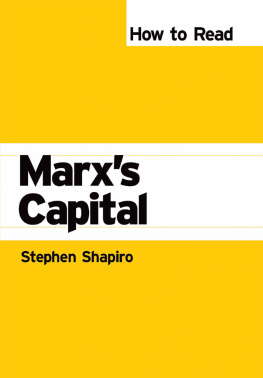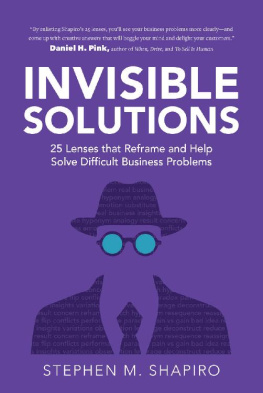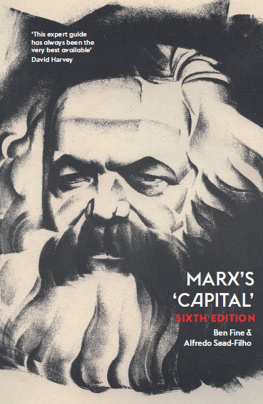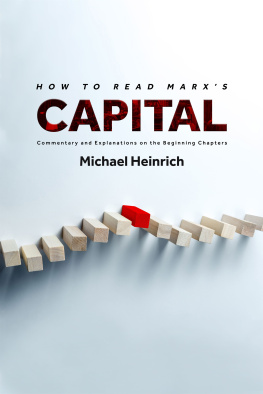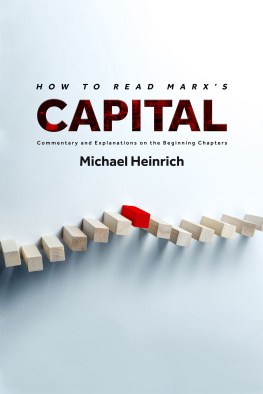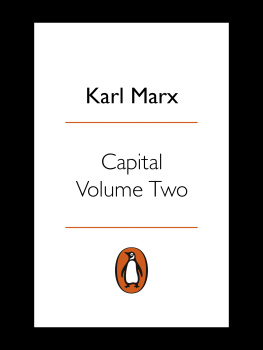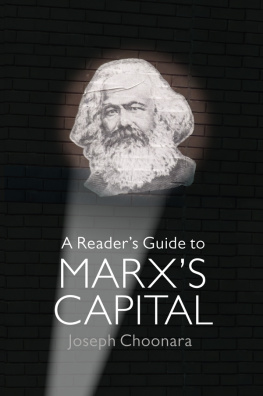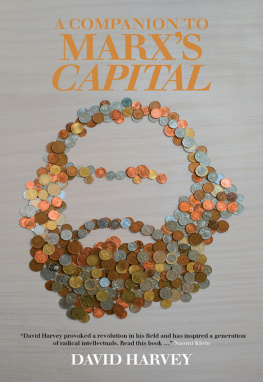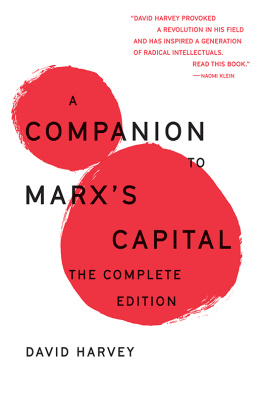How to Read
Marxs Capital
How to Read Theory
Series Editors:
Stephen Shapiro, Department of English and Comparative Literary Studies, University of Warwick Ed White, Department of English, University of Florida
How to Read Theory is a new series of clear, introductory guides to critical theory and cultural studies classics designed to encourage readers to think independently. Each title focuses on a single, key text and concisely explains its arguments and significance, showing the contemporary relevance of theory and presenting difficult theoretical concepts in clear, jargon-free prose. Presented in a compact, user-friendly format, the How to Read Theory series is designed to appeal to students and to interested readers everywhere who are coming to these key texts for the first time. Never before have the classic texts of theory and cultural studies been made so accessible.

First published 2008 by Pluto Press
345 Archway Road, London N6 5AA
and 839 Greene Street, Ann Arbor, MI 48106
www.plutobooks.com
Copyright Stephen Shapiro 2008
The right of Stephen Shapiro to be identified as the author of this work has been asserted by him in accordance with the Copyright, Designs and Patents Act 1988.
British Library Cataloguing in Publication Data
A catalogue record for this book is available from the British Library
ISBN 978 0 7453 2562 0 hardback
ISBN 978 0 7453 2561 3 paperback
eISBN 978 1 7837 1085 0
Library of Congress Cataloging in Publication Data applied for
This book is printed on paper suitable for recycling and made from fully managed and sustained forest sources. Logging, pulping and manufacturing processes are expected to conform to the environmental standards of the country of origin.
10 9 8 7 6 5 4 3 2 1
Designed and produced for Pluto Press by
Chase Publishing Services Ltd, Fortescue, Sidmouth, EX10 9QG, England
Typeset from disk by Stanford DTP Services, Northampton
Printed and bound in India
Preface
For a writer like Marx, who glories in contradictions, heres one: the length and complexity of the first volume of Capital pose a daunting challenge to first-time readers. Yet few other works in the modern age have been so important to such a widely international audience, especially those with little formal education or literacy. Marx himself was acutely aware of the tension between the difficulty of Capitals early passages and his desire that the book should be meaningful to the working class. While encouraging readers to persevere, he also, at times, suggested that they might skip the first, more theoretical, parts and asked his life-long collaborator, Friedrich Engels, to summarize Capitals arguments in a shorter book.
What Marx could assume, though, was that his contemporaries would have some familiarity with the terminology and basic outline of his argument, since they belonged to a widespread left-wing culture and community. Today is a different story. Many of you will be reading Marx in isolation from any supportive environment. Even those lucky enough to be in a classroom that discusses Marx will find that the pressures of modern education often do not allow time to see the full panorama of Capitals arguments. You may find that you will be told what Marx claims, but not have the space to process Marxs construction of his claims in ways that allow you to think these through for yourself.
How to Read Marxs Capital attempts to support readers in their early steps towards a self-reliant understanding of Marx. Just as no printed map can replace the personal experience of learning the way to a destination, this book should enable, but not replace, your own reading of Capital. No abbreviated version can convey the richness of Marxs writing or even pretend at completeness, but it may, hopefully, give you the confidence to discover these for yourself. To help ease your way, I follow Capitals chapter-by-chapter structure and often quote Marxs own words so they will seem less strange or incomprehensible when you next read them. Ideally this method will equip you to read further in Marx and all those later writers who take his claims as their starting point. In short, this guide should be a starting point, not a conclusion.
There are two standard English translations of the first volume of Capital from the German, a nineteenth-century one by Samuel Moore and Edward Aveling and a twentieth-century one by Ben Fowkes, which is easily available in a Penguin Books edition (first published 1976). There are good reasons to prefer either version, but the translation referenced here is Fowkess. All quotations will be parenthetically indexed to this later edition.
A few words about words. In Capital, Marx refers to capital but never to capitalism, since the style of ism-ing a social or cultural movement was less common in his day. Here I use capital and capitalism as interchangeable, often preferring the latter as less awkward for contemporary English readers. In his translators note, Fowkes explains that he renders the German word Arbeiter as worker, rather than labourer, which Moore and Aveling used. Fowkes did so because, in 1976, he felt that worker had less of a negative connotation than labourer. Today, the reverse might be true. Rather than be held hostage to momentary tastes, I use both without prejudice.
One feature of capitalist-defined modernity is that an author, as a producer of text, is distanced from her or his readers, the consumers of that text, by the interference of the price-setting market place. A book, after all, is also a commodity and thus subject to the same rules of capitalist commodification that Marx brilliantly describes in Capital. Though we may be anonymous to each other, I do not write in isolation. For the possibility of these pages has been made not only by Marx, but as well by the many who have struggled to achieve a better life than the one that capitalism has on offer. Similarly, my intention is not just that you read this simply to understand Marx, but to use your comprehension to carry on with the unfinished project of repairing the damage that capital has wreaked on human life and aspirations.
Fr Anne
Part One: Commodities and Money
Chapter 1. The Commodity
Section 1. The Two Factors of the Commodity: Use-Value and Value (Substance of Value, Magnitude of Value)
Marx begins Capital by saying that [t]he wealth of societies in which the capitalist mode of production prevails appears as an immense collection of commodities; the individual commodity appears as its elementary form. Our analysis therefore begins with the analysis of the commodity (125).
These opening lines contain three interlocking themes analytical, socio-historical, and experiential that recur in Marxs study of capitalism. Firstly, he rejects the claims of free-market, liberal economists, typically represented by Adam Smiths 1776 An Inquiry into the Nature and Causes of the Wealth of Nations. Even if you have not formally studied any economics, you are probably familiar with the common sense of liberal political economy, because its claims are the ones often taken to be true by mainstream politicians and journalists. Smith argues that market exchanges involve consensual agreements between buyers and sellers, who trade with one another to satisfy their own needs. In this light, he believes that if commerce is liberated from the states interference through taxes and tariffs, then the market place will spontaneously expand to benefit everyone. For Smith, while humans trade for selfish reasons, they must, however, learn to co-operate with each other to achieve their desires. This produces fellow feeling, which, along with the checks of supply and demand, is the invisible hand that prevents traders from creating market crises and conflict.


